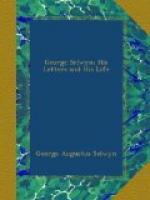Lord March’s election at the Old(29) is to be to-night, if you can call a constant ejectment an election. I thank you for your offer of a Circassian in case you travel into Greece; you must suppose me to be like the Glastonbury Thorn, to receive any benefit by it.
I am also much obliged to you for your hint about Hazard. Foolish, very foolish it is I grant you, and if anything was prevalent enough with me to relinquish so old and pernicious a practice, it would be your condemnation of it. Heureusement pour moi, the occasion fails me more than my prudence would serve me, if that offered. The rage there is for Quinze is my great security. Can you forgive these borish letters; can you excuse my leaving you to go and sup with Sir Ch[arle]s in Privy Garden?
My dear Lord, you have been very kind in writing so often to me; the only mischief of it to me will be, that you will have accustomed me to that which I cannot expect, when you are no longer in that state of retreat and indolence in which you have been at Nice. I owe much to your friendship and great complaisance on all occasions, but I cannot expect to interfere with what will occupy you in those places with so much reason. However, whatever you are, I hope I may have leave to assure you from time to time how truly and affectionately I am, and ever shall be yours.
I should be glad to know if all my letters have come to your hands.
(22) George Sackville Germaine (1716-1785); known from 1720 to 1770 as Lord George Sackville, from 1770 to 1782 as Lord George Germaine; son of the seventh Earl and first Duke of Dorset. A Member of Parliament and a soldier, he became in 1775 Secretary of State for the Colonies in Lord North’s Administration until the fall of his chief. His rise to the peerage in 1782 as Viscount Sackville gave cause to some acrimonious debates, which are referred to later, see Chapter 5. The Letters of Junius have often been ascribed to Sackville’s pen.
(23) Lord William Gordon; brother of the fourth Duke of Gordon and of Lord George of the Gordon Riots fame. He was Ranger of Windsor Park.
(24) Henry, third Duke of Buccleugh (1746-1812); eulogised in Lord Carlisle’s well-known verses on his Eton schoolfellows. He succeeded as fifth Duke of Queensberry in 1810.
(25) Colonel Brereton on leaving the army had become a gambler of doubtful reputation.
(26) Frederick St. John, second Viscount Bolingbroke (1734-1787); known among his friends as “Bully.” He succeeded his uncle, the famous Henry St. John, in 1751, and married in 1757 Lady Diana Spencer, daughter of the third Duke of Marlborough; the marriage was dissolved in 1768. He married secondly, in 1793, Arabella, daughter of the sixth Lord Craven.
(27) Granville, second Earl Gower, first Marquis of Stafford (1721-1803). Appointed a Lord of the Admiralty in 1749, and resigned in 1751; having filled various court offices he became in 1767 President of the Council. He resigned in 1779. Upon Pitt’s accession to power in 1783 he became again Lord President of the Council; in 1784 left this office and was appointed Lord Privy Seal; in 1786 created Marquis of Stafford; in 1794 resigned the office of Privy Seal. At first opposed to America’s independence, he later declared against the war. He was the father of Lady Carlisle.




